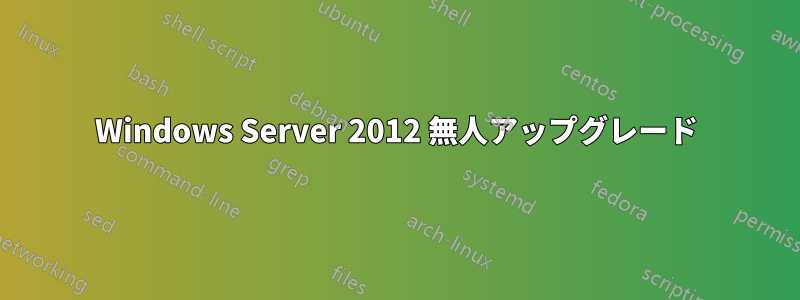
私は Windows Server ソフトウェアの使用経験が浅く、現在は Windows Server 2008 R2 データセンターを使用しています。Server 2012 にアップグレードしたいと考えています。
Windows サーバーで無人アップグレードを実行するにはどうすればよいでしょうか。このサーバーに物理的にアクセスできません。無人インストール (ディスクを消去してアップグレードしない) を実行する手順は見つかりましたが、アップグレードするにはどうすればよいでしょうか。
答え1
上記の推奨に従って、私は次のことを実行しました。
- 仮想マシンに Windows Server 2008R2 のデモ バージョンをインストールしました。
- Windows Server 2012R2のデモ版を入手しました
- この記事をフォローwindows-server-2012-無人(IP を追加するためにいくつかの調整を加える必要がありました)
追加のプロパティについては、このサイトを参考にしました。Windows Server 2012 自動インストール設定
そして、RDP セッションから Windows 2008R2 を 2012R2 に自動的にアップグレードできました。
簡単に言うと、手順は次のとおりです。
- Windows ADK (アセスメントおよび展開キット) (adksetup.exe バージョン 8.100.26866 以上) を検索します。
- インストールを実行するときは、展開ツールと Windows プレインストール環境 (Windows PE) を選択します。
- インストールしたら、Windows システム イメージ マネージャーを開きます。(スタート メニューから)
- ISOにアクセスし、install.wimソースファイルを見つける必要があります(通常は[iso]\sources内にあります)。
- イメージを作成するときに、使用する OS バージョンを選択する必要があります。
- イメージの準備ができたら、構成にさまざまな設定を追加する必要があります。
構成サンプルをコピーして名前を付けます。自動アンアテンド.xml必要に応じて更新します (ツールまたはメモ帳を使用、ツールの使用を推奨)。アップグレードを実行するには、[windows source]\setup.exe /unattend:"\path\OS\Autounattend.xml" が必要です。
構成サンプル
<?xml version="1.0" encoding="utf-8"?>
<unattend xmlns="urn:schemas-microsoft-com:unattend">
<settings pass="specialize">
<component name="Microsoft-Windows-Shell-Setup" processorArchitecture="amd64" publicKeyToken="31bf3856ad364e35" language="neutral" versionScope="nonSxS" xmlns:wcm="http://schemas.microsoft.com/WMIConfig/2002/State" xmlns:xsi="http://www.w3.org/2001/XMLSchema-instance">
<ComputerName>mysuperComputer</ComputerName>
<ProductKey>123-1234-12345-12345-XXXX</ProductKey>
<RegisteredOrganization>Somewhere</RegisteredOrganization>
<RegisteredOwner>Me</RegisteredOwner>
<TimeZone>Pacific Standard Time</TimeZone>
</component>
<component name="Microsoft-Windows-TerminalServices-LocalSessionManager" processorArchitecture="amd64" publicKeyToken="31bf3856ad364e35" language="neutral" versionScope="nonSxS" xmlns:wcm="http://schemas.microsoft.com/WMIConfig/2002/State" xmlns:xsi="http://www.w3.org/2001/XMLSchema-instance">
<fDenyTSConnections>false</fDenyTSConnections>
</component>
</settings>
<settings pass="windowsPE">
<component name="Microsoft-Windows-International-Core-WinPE" processorArchitecture="amd64" publicKeyToken="31bf3856ad364e35" language="neutral" versionScope="nonSxS" xmlns:wcm="http://schemas.microsoft.com/WMIConfig/2002/State" xmlns:xsi="http://www.w3.org/2001/XMLSchema-instance">
<SetupUILanguage>
<UILanguage>en-US</UILanguage>
</SetupUILanguage>
<InputLocale>en-US</InputLocale>
<SystemLocale>en-US</SystemLocale>
<UILanguage>en-US</UILanguage>
<UserLocale>en-US</UserLocale>
</component>
<component name="Microsoft-Windows-Setup" processorArchitecture="amd64" publicKeyToken="31bf3856ad364e35" language="neutral" versionScope="nonSxS" xmlns:wcm="http://schemas.microsoft.com/WMIConfig/2002/State" xmlns:xsi="http://www.w3.org/2001/XMLSchema-instance">
<UserData>
<ProductKey>
<Key>123-1234-12345-12345-XXXX</Key>
<WillShowUI>OnError</WillShowUI>
</ProductKey>
<AcceptEula>true</AcceptEula>
<FullName>Me</FullName>
<Organization>Me</Organization>
</UserData>
<ImageInstall>
<OSImage>
<InstallFrom>
<MetaData wcm:action="add">
<Key> /IMAGE/NAME</Key>
<Value>Windows Server 2012 SERVERSTANDARD</Value>
</MetaData>
<Path>\\SOMESERVER\Windows Server\install.wim</Path>
</InstallFrom>
<InstallTo>
<DiskID>0</DiskID>
<PartitionID>1</PartitionID>
</InstallTo>
</OSImage>
</ImageInstall>
<DiskConfiguration>
<WillShowUI>OnError</WillShowUI>
<Disk wcm:action="add">
<CreatePartitions>
<CreatePartition wcm:action="add">
<Order>1</Order>
<Size>1000</Size>
<Type>Primary</Type>
</CreatePartition>
</CreatePartitions>
<ModifyPartitions>
<ModifyPartition wcm:action="add">
<Active>true</Active>
<Extend>true</Extend>
<Format>NTFS</Format>
<Letter>C</Letter>
<Order>1</Order>
<PartitionID>1</PartitionID>
</ModifyPartition>
</ModifyPartitions>
<DiskID>0</DiskID>
<WillWipeDisk>true</WillWipeDisk>
</Disk>
</DiskConfiguration>
<WindowsDeploymentServices>
<Login>
<Credentials>
<Password>thisisasecret</Password>
<Username>Administrator</Username>
</Credentials>
</Login>
</WindowsDeploymentServices>
<UpgradeData>
<Upgrade>false</Upgrade>
</UpgradeData>
</component>
<component name="Microsoft-Windows-TCPIP" processorArchitecture="amd64" publicKeyToken="31bf3856ad364e35" language="neutral" versionScope="nonSxS" xmlns:wcm="http://schemas.microsoft.com/WMIConfig/2002/State" xmlns:xsi="http://www.w3.org/2001/XMLSchema-instance">
<Interfaces>
<Interface wcm:action="add">
<Ipv4Settings>
<DhcpEnabled>true</DhcpEnabled>
</Ipv4Settings>
<Identifier>1</Identifier>
</Interface>
</Interfaces>
</component>
</settings>
<settings pass="oobeSystem">
<component name="Microsoft-Windows-Shell-Setup" processorArchitecture="amd64" publicKeyToken="31bf3856ad364e35" language="neutral" versionScope="nonSxS" xmlns:wcm="http://schemas.microsoft.com/WMIConfig/2002/State" xmlns:xsi="http://www.w3.org/2001/XMLSchema-instance">
<RegisteredOrganization>-</RegisteredOrganization>
<RegisteredOwner>-</RegisteredOwner>
</component>
</settings>
<cpi:offlineImage cpi:source="wim:c:/temp/install.wim#Windows Server 2012 R2 SERVERSTANDARD" xmlns:cpi="urn:schemas-microsoft-com:cpi" />
</unattend>
答え2
ISO の内容をデスクトップにコピーし、インストーラーをシンプル アップグレード モードで実行するだけで、Server 2008R2 DC サーバーを 2012R2 DC にアップグレードできました。無人ではないことは承知していますが、再起動が必要になるまで接続されたままになります。約 5 分待つと、RDP で再び接続できるようになります。
まず、Windows Update が最新であることを確認する必要があります。また、最悪の事態に備えて、事前にバックアップを取り、バックアップを復元するためのメンテナンス期間を十分に確保していない限り、実稼働サーバーではこれをお勧めしません。


